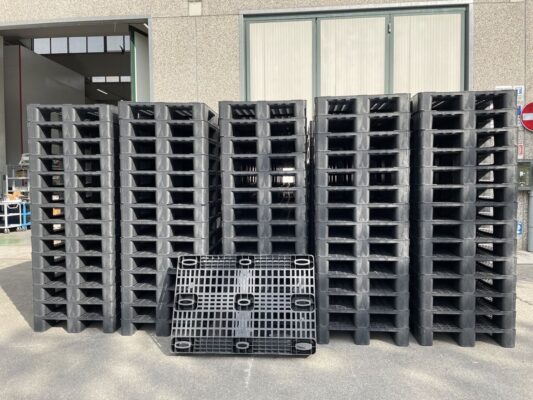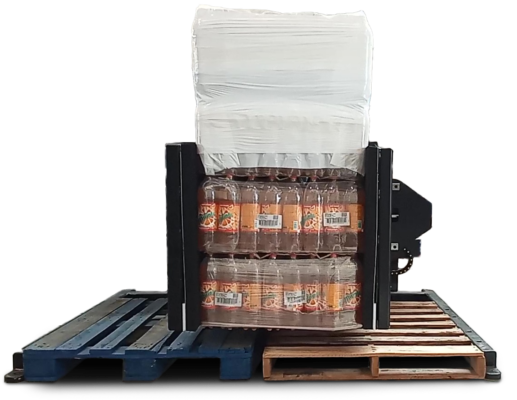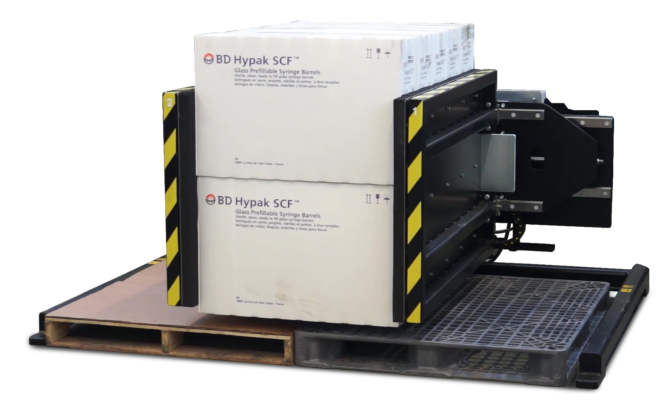Plastic Pallet vs Wooden Pallet, which one should you choose and how to exchange them? Well.. this could be a long story but we’ll do a nice summary. First of all, there are automatic machines that perform the pallet changing operation avoiding operator fatigue. Nonetheless, in this aticles we will explain the differences between plastic vs wood pallets.
How to save on pallets costs?
The pallet has blocks at the base with openings for pallet turner to easily lift it without tilting. Pallet saves time spent in transporting the bulk of goods. It reduces the occurrence of damage and allows insulation to products from the underlying bottom.
Top Industries offer pallet tipper machines that can replace costly shipping pallet with standardized low-quality ones and thus save quality pallets from shipping and losing it to recipients. The pallet is crucial for manufacturers, so they often wonder, which pallet type to buy – plastic vs wood pallets.
More than 90% of shippers opt for wooden pallets, but there are several factors to consider before investing. Each manufacturer needs to determine it after weighing the difference between plastic pallets vs wooden pallets seriously.

Plastic pallets – pros
- Plastic can be cleaned and sterilized easily, so is a popular option for sectors that follow strict hygiene protocols like food, beverage, and pharmaceutical.
- No concerns about bugs or mold because they are not porous.
- Designed for durability and is weather-resistant.
- Have no fasteners or nails that can hamper during transport.
- Plastic pallets are lighter than their wooden counterparts.
- Don’t give out any moisture, so the concern about contamination is also reduced.
Plastic pallets – cons
- Plastic pallets are 3X costly, which means the manufacturer loses it if the pallet is shipped overseas.
- The plastic pallet is reusable but if damaged cannot be repaired.
- The plastic pallet is designed from HDPE {high-density polyethylene] a product of natural gas or petroleum, which is a concern for sustainability. It is not eco-friendly.
- Plastic pallets are claimed to be durable but under temperate outdoor climates or temperature-controlled indoor conditions.
- Loads more than 1,500 pounds make plastic pallets buckle.
- Even if the plastic pallet is light, they have a slippery smooth surface, so stacking more than a specific height is impossible and this is a headache for storing.

Wooden pallets – pros
- Wooden pallet is considerably cheaper than plastic ones.
- It is sturdy and holds more weight.
- To make wooden pallets more sturdy there are different wood options.
- When a wooden pallet is damaged you can repair it.
- A pallet designed from wood that is harvested from sustainable forest has no carbon footprint because it stores carbon and doesn’t release it into the environment.
- Managed forests harvest wood to make furniture and building material, while the pallet is designed from leftover lumber.
Wooden pallets – cons
- Wood pallets use nails and fasteners that can damage if dislodged. It is rare but not impossible.
- Wood pallets have splinters.
- You can stack wooden pallets more easily as they are not smooth or slick.
- Many claim wood pallets buckle, splinter, and break with ease but only when the quality of wood is poor or the load it carries is wrong for pallet configuration or moved, loaded, & unloaded improperly.
How to exchange pallets?


Plastic Pallet vs Wooden Pallet: Which material should you choose?
- Your sector – Some sectors use only plastic and the remaining use only wood. It is sensible to choose a standard that is easy for transportation and abides by customer expectations unless there are some valid reasons.
- Product – Consider the products you are moving. Some manufacturers need sterilized pallets, so plastic is the best option. For heavy machinery, wood is a great option.
- Product weight – A product weight of more than 1,500 pounds will need a wooden pallet for shipping.
- Product sensitivity – Product sensitivity to punctures from loose fasteners or nail-like canisters can cause a spill disaster, so a plastic pallet is the best alternative [especially if plastic supports the weight].
- Environment impact – Plastic pallets last long but if damaged are not repairable because they need to be melted for recycling. Wooden pallets are designed from sustainable natural resources, so are easily repaired as well as recycled.
- Purpose – If the pallet is used to display in-store then plastic looks more appealing than wood. In big box stores and warehouses, the material of a pallet is of no matter.
- Will you export? – Wood is the best option for exporting loads. As you are shipping overseas, the pallets will not be returned, so wood is a cheaper option.
- Is cost a crucial factor? – If pallet cost is your budget issue then wood is an alternative to three times costly plastic pallet.
- Do you need customized pallet sizes? – Plastic pallet customization is hard and more costly than wood material.
- Determine warehouse fire codes – Wood material burns more quickly than plastic pallets. Understand your warehouse’s fire codes, if you plan to invest in UL-listed plastic pallets designed to burn at a higher temperature.
- Carbon footprint – If your business prioritizes green activities then a wooden pallet is a clear option over plastic. Wood is a sustainable and eco-friendly option, while plastic is designed from non-renewable resources.
It is clear, why more than 90% of manufacturers use wooden pallets. To make a decision you will need to evaluate the tradeoffs. Ask yourself some of these questions –
- Shipping loads on plastic pallets makes in-store display pretty but is it worth added expense?
- If you are shipping fragile items on wood with an expectation to save a small percentage then is the small damage risk worth the lower cost?
- Is it worth choosing a non-renewable option over an eco-friendly one for your company? Will your potential clients approve?
At times, plastic material is actually the only option. Industries that need pallet sterilization cannot choose wood. The bottom line is to weigh options and risk: reward ratio for making good decisions suitable to their unique applications. If you would more information about plastic vs wood pallets, please contact us!
